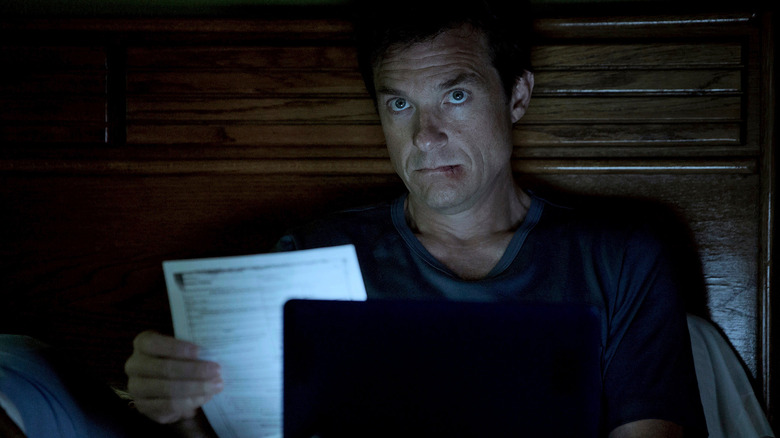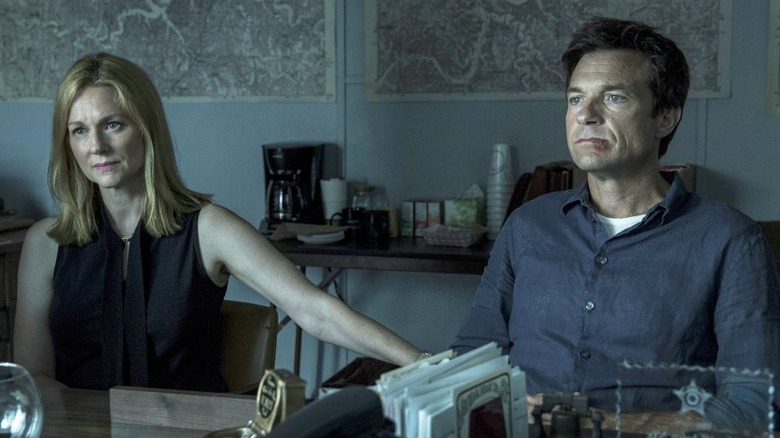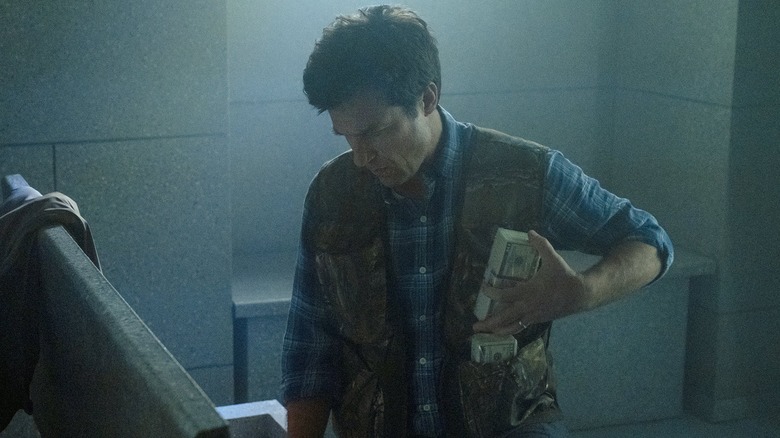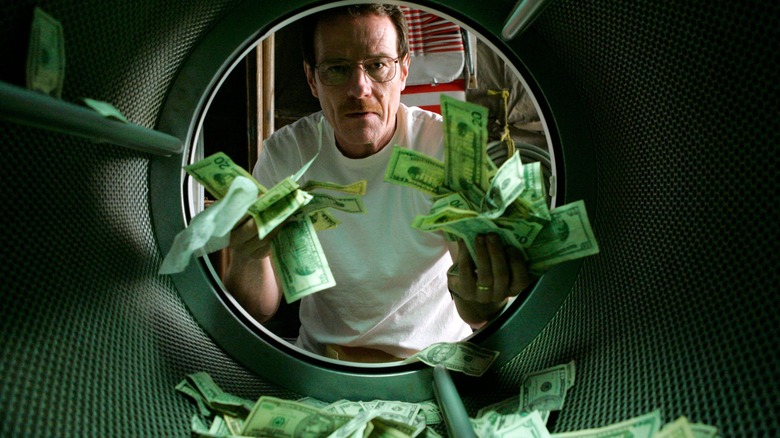Why Marty's Money Laundering Technique In Ozark Doesn't Actually Work
Stop me if you've heard this story before: an ambitious criminal is forced into increasingly high stakes situations as they desperately scramble to survive an elaborate criminal enterprise that's perpetually threatening their life. Toss in some constant concern about their loved ones, a drug cartel or two, and the story gets even more specific. Is this in reference to one of the past decade's most loved series, "Breaking Bad"? Or to the groundbreaking drama that came before, "The Sopranos"? NBC's "Good Girls" also fits the bill, as does "Narcos," but I was actually thinking of another Netflix gem: "Ozark." This just goes to show that when it comes to TV criminals, audiences have plenty of options.
Between these five series and so many more, we've seen an awful lot of criminal activity on TV. With the return of "Ozark" finally on the horizon, and Marty Byrde (Jason Bateman) set to rise or fall in his final 14 episodes, it's time to break down the specifics of his Ozark-based crimes. How does Marty's money laundering operation actually work — and how close to reality is the show's portrayal?
The Crimes of Marty Byrde
When we first meet Marty Byrde, he's a Chicago-based financial advisor with a precarious side-hustle: laundering money for the Navarro drug cartel, the second largest in Mexico. His firm is small-time but comfortable, run by Marty and his partner Bruce Liddell (Josh Randall). If not for the events that kickstart the series, Marty would have continued living a blissfully boring life in a nearly loveless marriage, but thanks to Bruce, the thrills are nonstop. It turns out Marty's partner was skimming money off the cartel's profit — to the tune of $8 million. In response, the cartel murders him and nearly follows suit with Marty. His saving grace is the promise of paying back the cash by setting up an exponentially bigger laundering operation in Missouri's Lake of the Ozarks. And so our tale begins.
Here's how it works: the cartel makes their millions selling heroin throughout the US, then delivers their cash to Marty. His job is to clean the "dirty" money so it can't be traced back to criminal activity and won't invite unwanted attention when spent. In the fourth episode of the series, Marty breaks the conundrum down in detail, spelling out his criminal approach:
"Say you come across a suitcase with $5 million bucks in it. What would you buy? A yacht? A mansion? A sports car? Sorry, the IRS won't let you buy anything of value with it. So you better get that money into the banking system. But here's the problem — that dirty money is too clean. You have to make it look like it's been around the block. You need a cash business, something pleasant and joyful, with books that are easily manipulated. You mix the $5 million with the cash from the joyful business. That mixture goes from an American bank to a bank from any country that doesn't have to listen to the IRS. It then goes into a standard checking account... your work is done, your money is clean."
How Marty Launders Money
The age-old scheme of cleaning money can be handled in any number of ways, but the method highlighted by Marty is cash-based businesses. Relying on cash means profits aren't tracked through receipts, making it much easier to funnel in a stray thousand here and there. The real-life mafia famously used pizza parlors and donut shops. In "Breaking Bad," Walter White (Bryan Cranston) uses a Car Wash and Gustavo Fring (Giancarlo Esposito) the infamous fast-food restaurant chain, Los Pollos Hermanos. In "Ozark," Marty acquires a few different business to launder his cash, but starts off with two —the strip club Lickety Splits and the Blue Cat Lodge lakeside inn.
The Byrdes first move to the Ozarks having promised the Navarro cartel $8 million dollars laundered under a tight deadline, so getting involved with two businesses in need of renovations helps Marty speed up the process. He ultimately takes two approaches: first is physically mixing the cartel dollars in with the businesses earnings. He brings the actual cash-register earnings to the bank, along with extra from cartel drug profits and reports it all under the business' name. Second, he exaggerates the cost of renovations, paying inflated sums to cartel-controlled suppliers for imaginary products and services. This caused some confusion from "Ozark" fans on Reddit, with one user wondering:
"When Marty invests in the resort he makes it look like he bought more carpet than they needed. I get making it look like someone bought more from you to launder the money. How though is he supposed to get the clean money if all he's doing is making it look like he bought more from someone else?"
In the sixth episode, "Book of Ruth," Marty's laundering practices are discussed in detail when Rachel takes a closer look at the books for the Blue Cat Lodge. She notes that they're pristine and beautiful, but obviously "bulls***." The pages are filled with orders she knows to be false: like a purchase of four air conditioners when only one was installed. The swim dock has a price estimation that's ridiculously bloated and she says "there is enough carpeting here for the goddamn mall of America." The money for these non-existent products was paid to cartel-owned businesses, set up to look real and legitimizing the money by virtue of it being exchanged for good and services. No goods were provided, but if only Marty and the corrupt cartel-owned business knows this, then all is well. Thanks to the books, there's a paper trail justifying the amount spent and funneled through the separate business.
Another possibility is offered by another Reddit user:
"I remember reading or watching something once about crime shows where they said they often either omit details or subtly inject incorrect information. In order not to inadvertently educate people how to do it themselves so it wouldn't surprise me if there are some deliberate inaccuracies as well,"
What TV Gets Wrong About Money Laundering
It's possible that the methods "Ozark" lays out wouldn't be successful in practice — I guess you can't really know unless you try. And now for the part of the article where I'm obliged to say please don't. "Ozark" viewers are well aware of how disastrously the money laundering scheme has gone for Marty Byrde, a pretty clever financial advisor with a much better understanding of money laundering than the average person. Though we haven't actually seen the end of "Ozark" at the time I'm writing this, things aren't looking great for Marty; I'm gonna go out on a limb and say that International money laundering for illegal drug cartels is an all-around bad idea. Especially if your main source for info is a TV show.
As much as "Ozark" and "Breaking Bad" get right, there's plenty they don't account for. Beam Solutions, a company that develops software to identify and prevent money laundering, analyzed "Ozark" in a blog post, writing:
"Marty takes a struggling business and begins funneling large amounts of money through it. While the change in volume of both withdrawals and deposits could be explained by a new owner trying to shake things up, this would generate the scrutiny of the bank and would make things much more difficult for Marty... We would expect a lot of these transactions to be flagged and reported to FinCEN. If the banks in the Ozark universe were using compliance software that's even a fraction as powerful as Beam, the suspicious activity reports would be pouring in.
Though Marty's money laundering approach is deemed both plausible and creative, they note that a bank would still flag such suspicious activity. Anyway, Marty's method isn't the end-all be-all of laundering money, and apparently most illegal operators have shifted away from washing money this way. While it's great TV to watch the Walter Whites and Marty Byrdes of the world literally toss cash into a dryer, moving money quickly (in increasingly elaborate ways) is much preferred. CrimeReads has a post about how criminals prefer moving cash from one jurisdiction to another to break audit trails and create bureaucratic barriers. Money is often smuggled through bulk cargo superbags, which can transport 2,200 pounds. Big surprise — breaking the law is a lot more complicated than it seems on TV ... which is really saying something given the amount of trouble Marty tends to find himself in.
You can check out all the perils of money laundering for yourself — the first three season of "Ozark" are available to stream on Netflix.



